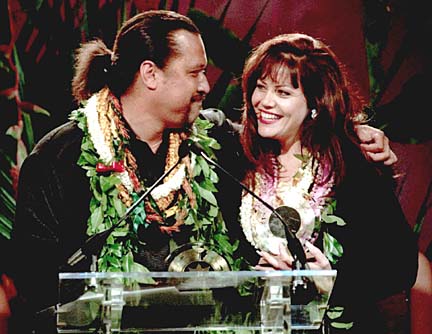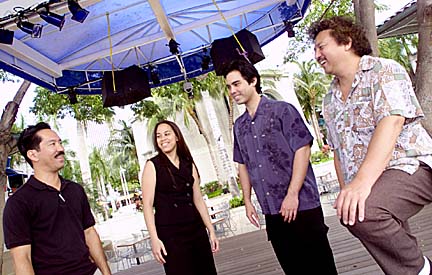


|
It’s not just Name a music genre or demographic, and chances are there's a national music award just for that category. Hawaii hasn't reached gridlock yet, but here, too, there are now four local music award programs intended to acknowledge some form of success or cultural contribution. Some people feel that having four separate award entities is redundant.
the Hokus anymore
4 local awards programs
now recognize outstanding
contributions to musicBy John Berger
jberger@starbulletin.comThe biggest and oldest are the Na Hoku Hanohano Awards, the regional equivalent of the Grammys, administered by the Hawai'i Academy of Recording Arts. The Hokus are actually four years older than HARA, having been created by Krash Kealoha in 1978 as a promotional vehicle for Hawaiian radio station KCCN.
He had created the Hokus as a good-fun, stuff-the-ballot-box radio station promotion in conjunction with the Ala Moana Americana Hotel, a hub of Hawaiian entertainment. Plenty of ballots were available there, and the hotel's headliners won lots of awards.
HARA assumed responsibility for the Hokus when it came into being in 1982 to promote Hawaii's recording industry. With that in mind, the concept of the Hokus changed dramatically. HARA followed the example of the Grammy's National Academy of Recording Arts and Sciences in limited voting privileges to HARA members, people with at least one local recording credit and people in affiliated industries.

|
Kealoha opposed this and ended his association with the awards he had created. He eventually was persuaded to serve a term as HARA president in the 1990s. He created a "Favorite Entertainer of the Year" category, in 1978 in which the winner is determined by public vote.HARA membership has never been a prerequisite for winning a Hoku. Almost every local recording released during a given calendar year appears on the preliminary ballot. The top five titles go on to the final ballot.
Eligibility -- who's really a resident, when was a particular release "commercially available" -- has been a recurring cause of controversy. Certain decisions by the HARA board have also marred the Hokus' credibility. The most infamous in recent years was classifying Amy Hanaiali'i Gilliom & Willie K as a "female vocalist" in 2000. They had been classified as a duo just a year before and won Group of the Year. Observers noted that Amy & Willie would have been up against perennial Hoku winners Na Leo for Group of the Year in 2000.
CONTROVERSIES ASIDE, the Hokus have been getting some competition in the last few years from Johnny Kai and his Hawaii Music Awards.
Kai, who cut his teeth playing Top 40 music as Jon Lorance in Waikiki in the early 1970s, returned to Hawaii in 1995 with a desire to help Hawaii's entertainers. Some of his early proposals included finding some way to get musicians more money, improving working conditions, creating a "think tank" to help find solutions to musicians' problems, laying down national standards of achievement for future generations of Hawaii's performing artists, and creating some awards for bar bands, music teachers and others who make music but are not recording artists.
Kai soon found that many local recording artists felt shut out of the Hoku Awards as well. Just as the Grammys were considered conservative and slow to add new categories and new musical forms, non-Hawaiian music was often dumped into a single catch-all category for the Hokus.
Kai moved while HARA dithered. Many who may have doubted the feasibility of his proposals saw benefits in the formation of an alternative music awards program. The Hawaii Music Awards got off to an unsteady start, but many who had never made it to the final Hoku Awards ballot were soon able to call themselves "award winners."
The Hawaii Music Awards continues to have credibility problems. The fact that many of Hawaii's prominent Hoku-winning recording artists are not even listed on preliminary ballots has perpetuated the perception that the Hawaii Music Awards are intended to massage the egos of acts that cannot win a Hoku.
A significant number of winners -- some of them the only nominee in a category -- often happen to belong to a record label that is a major underwriter of the event. Observers also noticed that two awards one year went to the Waikiki show that was employing Kai as an entertainer.
Kai remains undeterred by criticism and remains determined to do something to boost the local music industry.
HARA HAS ADDED several new categories for contemporary mainstream music since Kai launched his awards seven years ago, so he may be credited with making one significant contribution.
Fans of traditional Hawaiian music are applauding the creation of a Hawaiian Music Hall of Fame and Museum. It was founded in 1994 to honor composers, musicians, chanters and singers who made significant contributions to perpetuating Hawaii's traditional music.
Inductees are selected annually by an advisory board whose members are chosen for their knowledge of Hawaiian culture and performance. As serious conservators of Hawaii's traditional music, the credibility of the Hawaiian Music Hall of Fame is without question.
Hawaii's newest local music awards program, Maui's Ka Leo Hano Awards, was created less than a year ago and exists to pay tribute to the individuals and groups who have significantly contributed to Hawaii's recording music industry.
Inductees are chosen by an anonymous group of people described as "local music industry" professionals. Honorees must have been involved in the local music industry for more than 25 years.
Hawaii's music awards
>> Johnny Kai presents the fifth annual Hawaii Music Awards at Kapono's in the Aloha Tower Marketplace at 6 p.m. Sunday. There is a $10 cover. >> HARA will present the 25th Annual Na Hoku Hanohano Awards at 5 p.m. May 21, in the Sheraton-Waikiki Hawaii Ballroom. Tickets for HARA members are $80 per person until May 1, $95 per person thereafter. Call 235-9424. >> The Hawaiian Music Hall of Fame and Museum commemorated the induction of Ray Kinney and Gabby Pahinui at Hawaii Theatre in February (see www.hawaiimusicmuseum.org). >> The Ka Leo Hano Awards recently recognized Gabby Pahinui (Male Vocalist), Genoa Keawe (Female Vocalist), the Brothers Cazimero (Group) and Jack de Mello (Non-Performer). The winner of an additional award determined by public vote will be announced at an awards ceremony June 30 at the Maui Arts & Cultural Center. Call 808-572-5730.
Click for online
calendars and events.